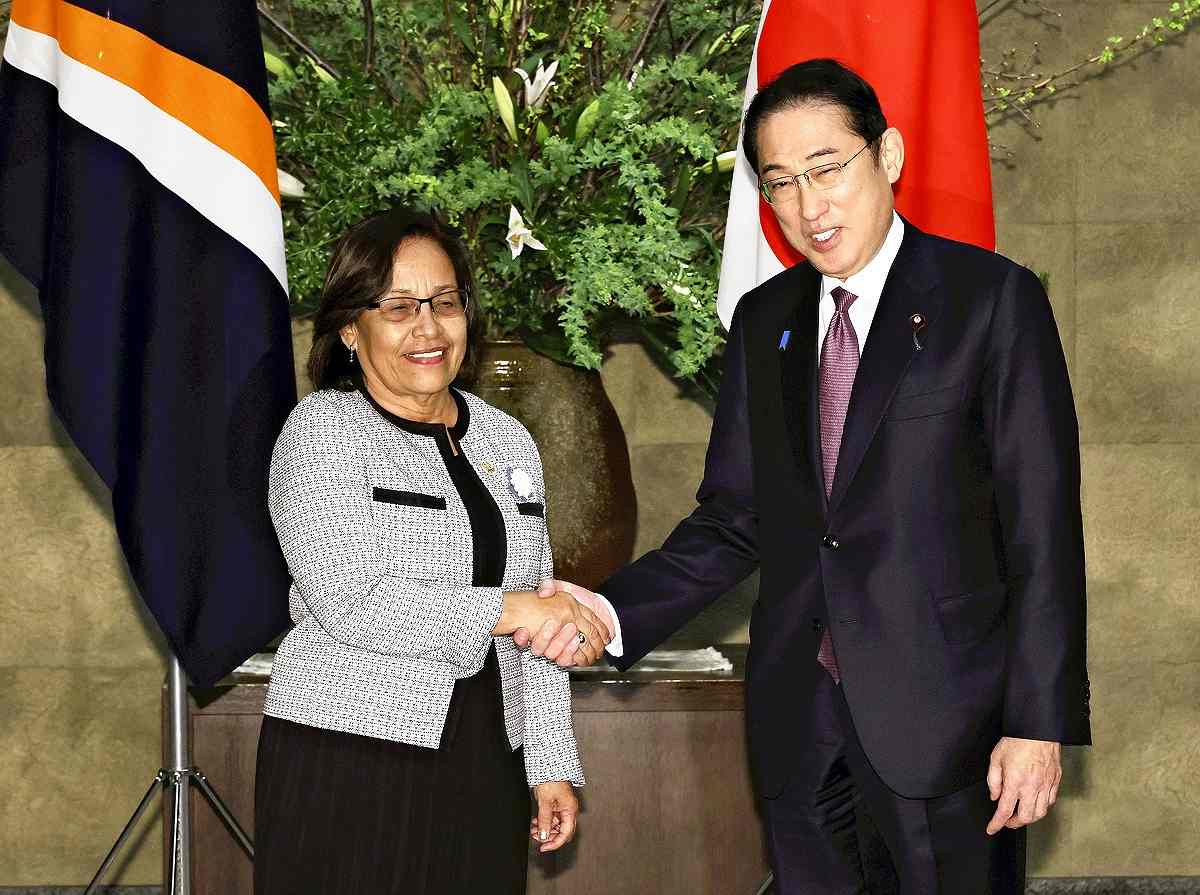Japan to Help Pacific Islands Build Infrastructure; Marshall Islands to Get ¥5 Billion to Rebuild Airport Terminal

Prime Minister Fumio Kishida, right, shakes hands with Marshall Islands President Hilda Heine at the Prime Minister’s Office in Tokyo on March 13.
1:00 JST, July 15, 2024
The government plans to announce a wide range of support measures to Pacific island countries based on their needs to coincide with the Pacific Islands Leaders Meeting, which is to be held in Tokyo from Tuesday to Thursday.
One major focus of the measures is infrastructure development, and Japan will support the rebuilding of a terminal at an international airport in the Marshall Islands together with the United States.
Tokyo and Washington intend to demonstrate a commitment to economic development in Pacific island countries to prevent them from becoming more dependent on China.
Japan is expected to sign an agreement Tuesday with the Marshall Islands on grant aid for the rebuilding of the terminal building at the Amata Kabua International Airport in the island nation. Japan will provide about ¥5 billion to the country, and the United States about ¥1.2 billion.
The Marshall Islands had sought financial support as there are concerns the airport, which was built more than 50 years ago, does not to meet international safety standards.
Japan and the United States apparently decided on the aid to get out ahead of China, as the Marshall Islands could take a more pro-China stance if Beijing were to launch similar operations in the country first.
To help build maritime strength, Japan will provide one fisheries research vessel each to the Marshall Islands, Micronesia, Papua New Guinea and Vanuatu. A patrol boat will also be provided to Nauru.
As for human resource development, Japan will announce during the meeting that it will begin supporting study in Japan by young administrative officials from the island countries. Tokyo plans to accept up to 26 people for this purpose from Solomon Islands, Fiji and Papua New Guinea between next year and 2028.
Besides subsidizing travel, school and living expenses, Japan will provide them with Japanese language training before their arrival, aiming to foster future pro-Japan leaders and strengthen relations between Japan and the countries.
Top Articles in Politics
-

Japan PM Takaichi’s Cabinet Resigns en Masse
-

Sanae Takaichi Elected Prime Minister of Japan; Keeps All Cabinet Appointees from Previous Term
-

Japan’s Govt to Submit Road Map for Growth Strategy in March, PM Takaichi to Announce in Upcoming Policy Speech
-

LDP Wins Historic Landslide Victory
-

LDP Wins Landslide Victory, Secures Single-party Majority; Ruling Coalition with JIP Poised to Secure Over 300 seats (UPDATE 1)
JN ACCESS RANKING
-

Producer Behind Pop Group XG Arrested for Cocaine Possession
-

Japan PM Takaichi’s Cabinet Resigns en Masse
-

Man Infected with Measles Reportedly Dined at Restaurant in Tokyo Station
-

Israeli Ambassador to Japan Speaks about Japan’s Role in the Reconstruction of Gaza
-

Videos Plagiarized, Reposted with False Subtitles Claiming ‘Ryukyu Belongs to China’; Anti-China False Information Also Posted in Japan
























